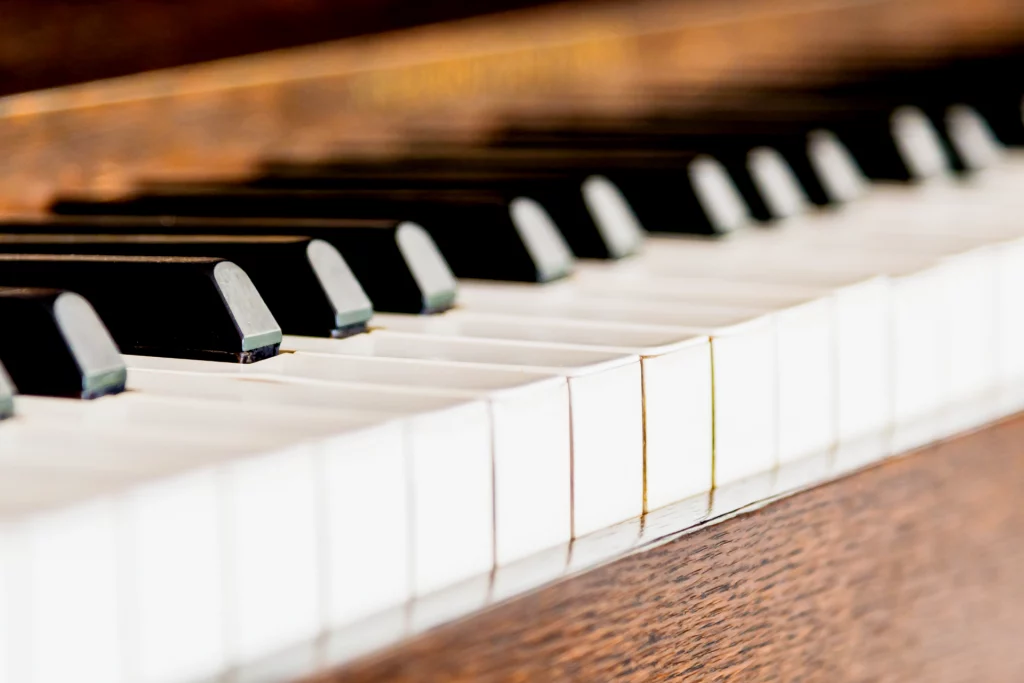
A good, well-maintained piano can be a statement piece in any house. It can last for generations and will give your place a classy look. However, a good piano should be properly maintained and regularly cleaned. Even if you don’t play a lot of dust and grime buildup may affect its condition.
Depending on how often you use your piano, you may need to thoroughly clean it at least once a month. You should also tackle any stains and smudges. The keys of the piano should be regularly dusted once a week (best done with an electrostatic duster).
The good news is that you can, in fact, easily clean your piano using common household products.
There are a few important things to take into consideration before attempting to clean your piano. If you have an older instrument, always make sure you determine the material of the keys. They can be ivory and ebony or plastic. Ivory keys typically feature a distinct line at the bottom of the black keys, indicating that the ivory was applied in two portions. The grain of natural ivory may be noticed on the finish. Solid ebony keys are not shiny and may be worn out at the end from all the years of playing.
Plastic key coverings were introduced in the 30s. You will not notice a line or a grain pattern. No matter which type you have, white keys will become yellow with time.
Cleaning plastic piano keys
- Remove dust – Use a disposable electrostatic or another type of duster to capture all particles and properly remove them from the whole surface of the piano. Make sure you work slowly so that the duster can get between all the keys.
- Wipe away any smudges – Grab a microfiber cloth and dampen it. Start at the base of the key and wipe all the way to its end. Apply gentle pressure and move to a clean area of the cloth as dirt transfers. If your piano keys are especially dirty or sticky, mix a solution of warm water and a few drops of mild dishwashing liquid. Dip the microfiber cloth in this soapy solution and wring it out until it is not dripping. Wipe the grime away. Rinse the cloth regularly when it becomes dirty.
- Dry the keys – The keys should not be left damp. Use a clean, dry, lint-free cloth to remove any moisture.
Cleaning natural ivory piano keys
Natural ivory comes from the tusk of an elephant or walrus and resembles human teeth. That means it can be cleaned in a similar way.
- Use an electrostatic duster to remove loose dirt and dust from the keys.
- Create a cardboard wedge. Use two pieces of cupboards to place between the keys as you are cleaning them. This will help prevent moisture from penetrating and getting trapped between the keys.
- Mix a cleaning solution – Squeeze out a small amount of basic toothpaste. Make sure it is not gel and does not contain whitening ingredients. Add a bit of warm water and mix until the toothpaste is completely dissolved.
- Scrub – Place the two cardboard pieces on both sides of the key you are cleaning, dip a toothbrush in the cleaning solution and tap it on the bowl until it is not dripping. Start at the top of the key and gently scrub to the end. Make sure to not overwet the keys.
- Rinse, repeat, and dry – Remove the cardboard and use a damp clean microfiber cloth to ‘’rinse’’ the keys. Wipe them thoroughly and make sure you remove all remaining cleaning solution. Place the cardboard wedges on both sides of the next key (replace them if they are wet) and repeat the process. Finish by thoroughly drying the keys at the end of the cleaning.
- Clean the ebony keys – Dust the ebony keys and wipe them with a damp microfiber cloth. Do not use toothpaste. If your ebony keys are stained, dirty, or sticky, use the soapy solution from before to wipe the grime away. Again, make sure you do not overwet them.
To disinfect your piano keys: Since the piano keys are regularly touched (possibly by more than one person) they most probably contain bacteria and microbes. Disinfection s important – it will prevent bacteria from spreading around and will help keep your household healthy. To disinfect your piano keys, dampen a microfiber cloth with hydrogen peroxide. It should be damp and not dripping. Carefully wipe each key and allow them to air dry before using the piano.
Extra tips:
- Always wash and disinfect your hands before playing. Do not play with wet hands.
- Keep the piano keyboards covered when not used.
